VIDEO
Claire Rutkowski (Senior Vice President, CIO Champion at Bentley Systems) discusses how to create an environment which has no proximity bias, specific ways to overcome proximity bias where it does exist, and shares tactics to ensure your value is noticed and rewarded.
Like what you see here? Our mission-aligned Girl Geek X partners are hiring!
- Check out open jobs at our trusted partner companies.
- Watch all ELEVATE 2023 conference video replays!
- Does your company want to sponsor a Girl Geek Dinner? Talk to us!
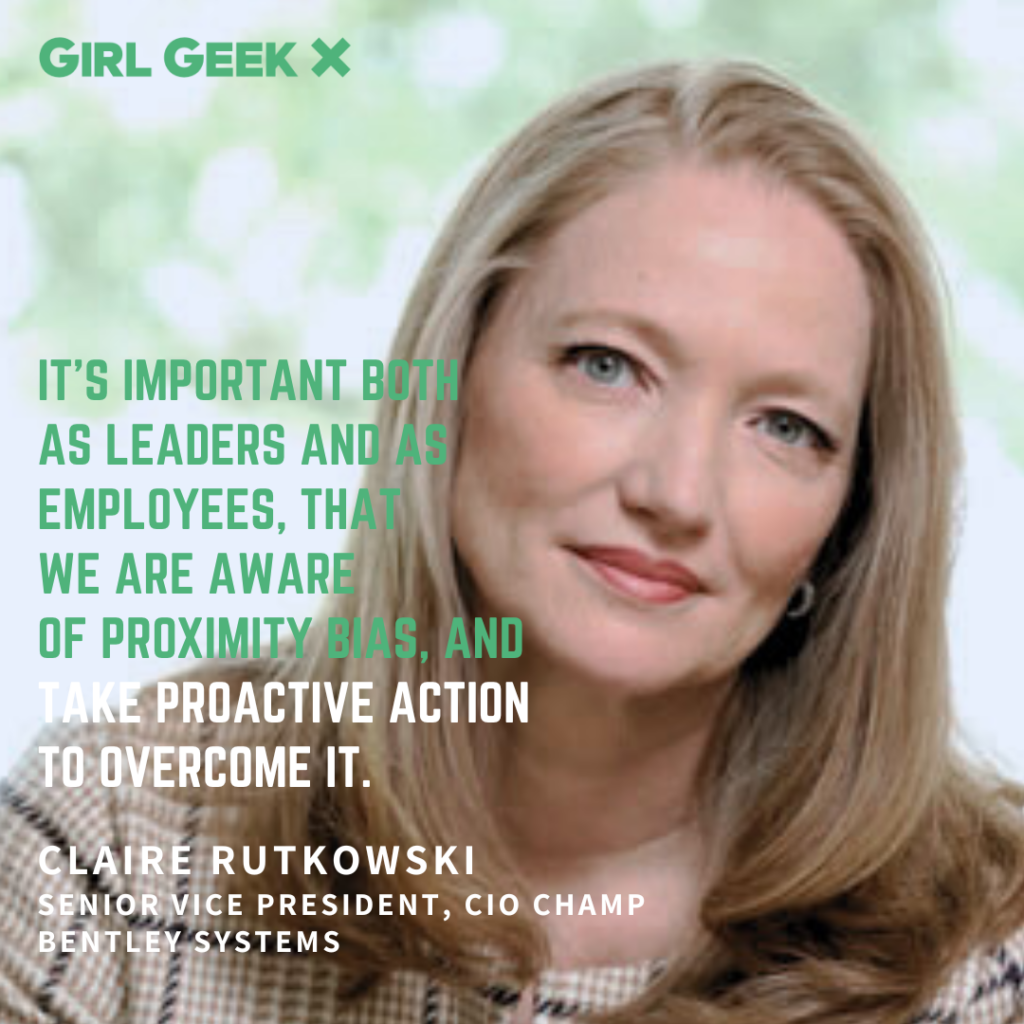
Angie Chang: Welcome to Elevate. My name’s Angie Chang, the founder of Girl Geek X, and today we welcome Claire, who is Senior Vice President and CIO Champion at Bentley Systems. She’ll be speaking to us about overcoming proximity bias, a very timely topic. Welcome, Claire.
Claire Rutkowski: My name is Claire Rutkowski. I am the Senior Vice President and CIO Champion at Bentley Systems, and I wanna talk to you today about overcoming proximity bias. I’ve been so inspired by our speakers so far today, loving the stories. And today I’m gonna talk to you about kind of my story on working remotely as well as give you some practical tips on things to do cuz we’re kind of in a whole different world these days. I’m curious about where people are watching. There’ve been lots of comments in the chat about calling in from Portland in the UK and DC and Chicago, which is where I am, and everybody I think is all over. But I’m curious about whether you’re in an office or working from home.
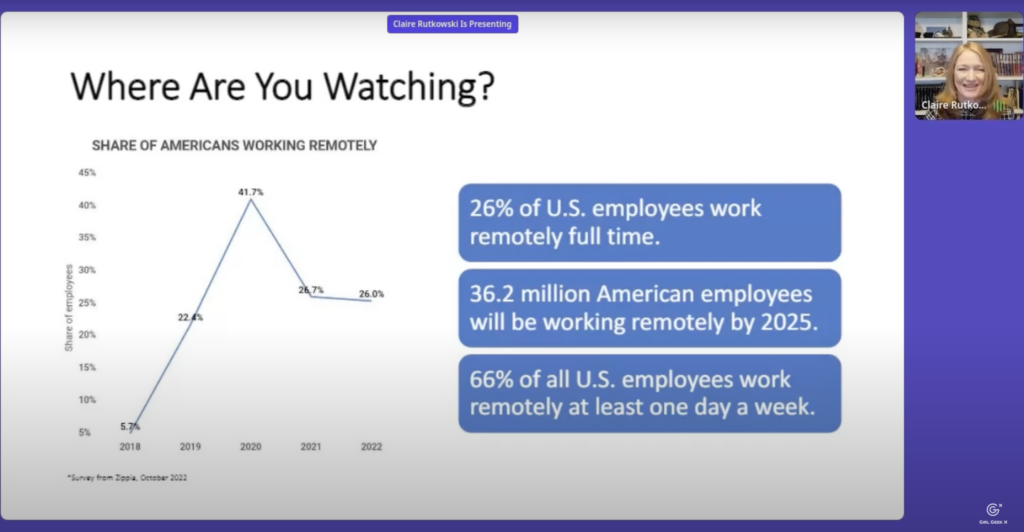
Claire Rutkowski: Now, I apologize in advance for international attendees that this is a sort of America’s focus survey here, but it was the most recent I could find. This survey found that 26% of us employees are working remotely full-time. That’s a lot. 36.2 million Americans are going to be working remotely by 2025. And two thirds of folks are working remotely at least one day a week. I think we all, those of us who have the opportunity to work from home. Boy, look at all those work from home, work from home, work from home, remote, comments!
Claire Rutkowski: I think for those of us who get to work from home, we very much value the ability to get a little bit more work life balance, maybe just being able to focus and not have people dropping in no drive-bys, you don’t have to commute, you don’t have places to go which takes up a lot of time. So it’s fabulous, but it has a darker side, which we’re gonna talk about. Now, to give a little context, I work at a company called Bentley Systems. I’m not gonna spend a lot of time on this, but Bentley produces the software that engineers use to design and construct and operate infrastructure like bridges and wind farms and roads and rail and everything else. We’re in 60 different countries and so we’re very used to geographically dispersed teams, which is great. But that doesn’t necessarily mean that pre pandemic, we were used to working remotely with home as the option.
Claire Rutkowski: Now, personally speaking, I’ve worked from home for a very long time and I’m gonna tell you about my journey to remote working very briefly. There are train tracks up for a very good reason. I’m gonna date myself here, but in the early two thousands, I took a job with a company called MWH and they were an engineering firm. And engineering firms tend to be very traditional. That’s changing, but they’re kind of old school. There was that belief that I have to see you to know that you are working. I joined as a consultant and I only agreed to take the gig for two weeks. I ended up being there for 19 years, but that’s a whole other story.
Claire Rutkowski: I said, I’ll take this gig for two weeks, but only if I can have Wednesdays working from home, because the commute was an hour and 50 minutes each way. Oh yes, it was a 20 minute drive to the train station, and then I had to sit on the train forever, and then walk to the office. It was a really long commute. And if it wouldn’t have been such a fun job, I never would’ve done it. But I only agreed to do it if I had Wednesdays to break up that commute.
Claire Rutkowski: And then what ended up happening, was each time I got a raise, that I thought kind of sucked, let’s say, cuz you know, there’s only a certain percentage that the company could give out in raises. And so whenever I felt my raise was lacking, I would say, “Okay. Well, I’m a little disappointed in a raise, but you could give me an extra day a week from home because the commute is terrible.”
Claire Rutkowski: And so I gradually worked my way in the early two thousands into full-time working from home, which was fabulous and I loved it, and I still do love it. I worked from home now and I think that people are increasingly moving to a full hybrid or working from home model as we saw from the survey results. That was my journey into working from home. I’ve been doing it for full-time, 15 plus years, so well before the pandemic.
Claire Rutkowski: But as I mentioned, there’s a darker side to working from home. And it’s one of the things that, that we really need to address proactively. It’s called proximity bias. In 2021, the Society for Human Resource Management did a survey, which Harvard Business Review reported on. They surveyed 800 supervisors and 67% said that remote workers are more replaceable than on-site workers. I’m just gonna let that sink in for a minute. 42% admitted. I love this one. No, I don’t really to forgetting about their remote workers when assigning work. Like how does that even happen? I don’t know how you forget about someone, but the general feeling was that onsite workers are more productive, which I kind of secretly die inside a little bit when I I read this report. But this is, this is sort of that unconscious bias of I know you’re working if I see you working.
Claire Rutkowski: Now, the problem with the problem with this data is that the perceptions are all wrong. They’re wrong. In 2015, a study by Stanford found that remote workers are 15% more productive. And Mercer, which we know is a very large large consulting HR talent management organization in the US, said that 98% of employers say productivity is the same or better since the pandemic began. And yet we had those results from the other survey. There’s conflicting data there. The data actually says workers are more productive.
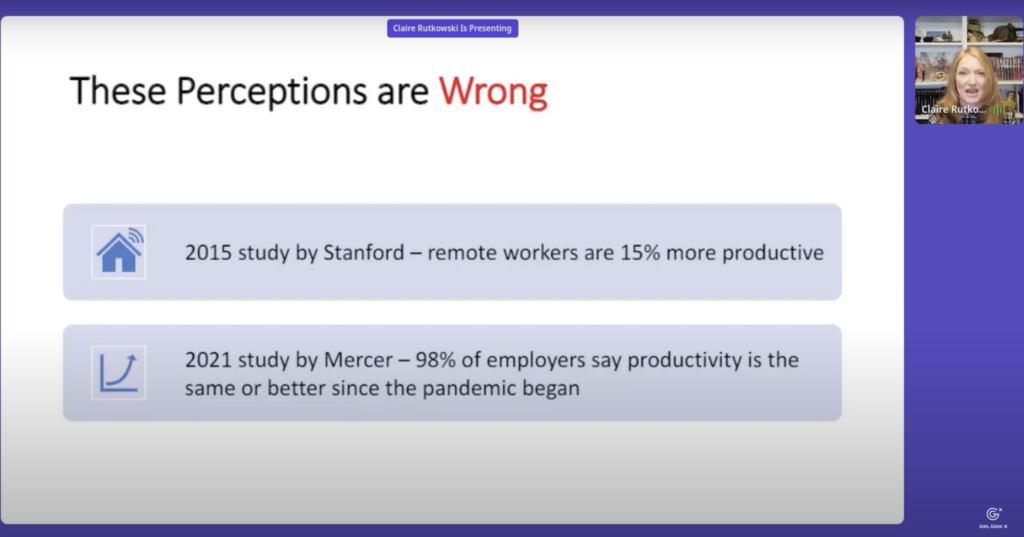
Claire Rutkowski: I know that myself. I used to run a team of 400 people and during lockdown, I would say our productivity went up 30 to 35%. That’s huge, right? And so post pandemic, I was like, okay, well we’re never going back to in the office. I want everyone to have a choice of where they wanna work because why would I walk away from a 30% increase in productivity? That would just be dumb. Nevermind the fact that it gives everybody so much more flexibility. It really helped people with work-life balance and childcare issues and family care issues as our last speaker was talking about, to be able to be flexible. Why walk away from that? That would be stupid.
Claire Rutkowski: But we have managers who still think, well, I’m more likely to give a promotion to somebody who shows up in the office. That’s bad. And the reason I really wanted to talk about that is to raise it as an issue. I know we as women on International Women’s Day, are very concerned about diversity. Our male allies who are here and who work with us in the office are also very concerned about diversity and inclusivity. And the problem with proximity bias is it creates even more of a diversity challenge. And here’s why.
Claire Rutkowski: Because the people who are those who are likely to experience or have experienced microaggressions or just outright discrimination in the workplace, whether it’s, we can think of a hundred different ways, right? Cutting people off, not listening to them making comments, you name it. Those are the same types of people who will more be more likely to choose to work from home. Why? So they don’t have to experience those microaggressions and annoyances or discrimination in person on a daily basis. You’re kind of buffered a little bit if you’re working from home.
Claire Rutkowski: But the problem with proximity bias is if people are choosing to work remotely and we have proximity bias, then promotions and the more important work likely going to the people in the office just sort of spreads the divide even further, right? Which is not what we want to happen. It’s really important both as leaders and as employees, that we are aware of proximity bias and take proactive action to overcome it. I don’t think there’s any point in saying it doesn’t exist cause it does.
Claire Rutkowski: If you lead a team, I think the most important thing that you can do is to be aware of proximity bias. Know that it happens. Make sure that you are not guilty of it, right? And do all that you can to create a level playing field – and what I mean by that, is making sure that there isn’t like, an A team, and a B team. You know, it’s really hard. Those of us who are remote know there’s nothing worse than being remote when there’s a bunch of people co-located in a conference room. It’s better with video technology nowadays, but it’s hard sometimes to feel included and God help you if somebody uses the whiteboard in the room, right? So annoying.

Claire Rutkowski: I think it’s important as a leader to make sure that, that you are creating that level playing field for everyone on your team by treating everyone the same. And how do you do that while you make sure nobody writes on the whiteboard in the room? First of all, use the whiteboard in [Microsoft] Teams. It’s a small step, but it helps a lot.
Claire Rutkowski: Also, be very purposeful with your calendar. Make sure that your one-on-one time is the same amount for the people who are in the office as the people who are not in the office. I’m using the words “not in the office” because “remote” has implications and I don’t actually like the connotations of the word remote, right? It makes it sound like you’re really far away, and not really connected. I think “geographically dispersed” or “not in an office” is just a more neutral way of saying it, right? Be conscious of the time that you spend and where you spend it if you’re a leader, and also make sure that you are continuously creating that sense of team, both with geographically-dispersed folks and people that you might be physically co-located with.
Claire Rutkowski: There are lots of ways that you can do that, whether it’s through virtual celebrations or simple things like starting a meeting with, “Hey everybody, turn your camera so that you can show us your view from your desk, right?” And that way everybody feels like they’re included. Another thing that’s really important is making sure that there are objective goals and everyone knows what those goals are and share them across the team, right? I think when people know what each other is working on, we avoid some of that. Well, are they working? Are they actually working? A lot of that, right? And make sure that you make it fun for your team.
Claire Rutkowski: There’s so many different things that can be done nowadays in terms of making sure that, that there are remote parties virtual happy hours, you name it. There’s so many different things to do as a leader to make sure that you recreate that sense of community for folks who aren’t necessarily in the office.
Claire Rutkowski: Now, the second thing that’s really important is, let’s say you’re not leading a team, but you are a contributor. You’re on a team and you are this, this first one actually goes whether you are remote or not. And whether you are in the same office as your manager or not. This is something that I’ve done ever since I started my Wednesdays from home many, many years ago. Make sure your manager knows what you’re working on, ma work.
Claire Rutkowski: Managing up is really important and it’s your responsibility, not your manager’s responsibility. One of the things that I’ve always done every Friday whether my managers ask for it or not, and I’m an SVP and I still do it, is on Fridays, I send an email saying, “Okay. Here’s what went well this week. Here’s what did not go well this week. And here’s what’s teed up for next week.” I call it the “no surprises” email. It’s not the “let me justify my existence by telling you every little thing I’ve done”. But it is making sure there’s no surprises for my boss. I do it out of respect for them. And when I lead a team, I ask my team, my directs to do the same for me. But that way there’s absolutely, you are visible, right?
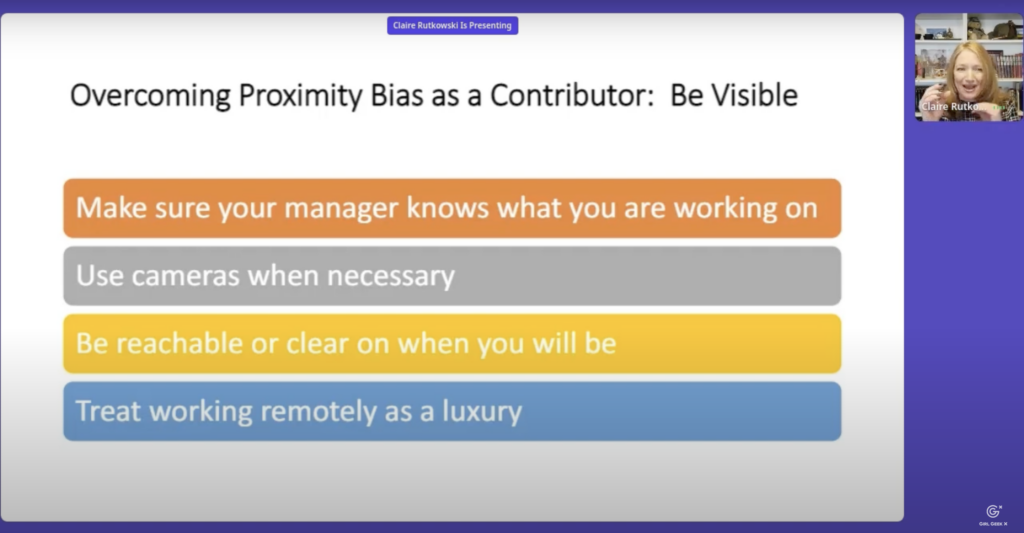
Claire Rutkowski: Use cameras when necessary. I say when necessary because using a camera is three times more mentally exhausting than not using a camera. Scientific studies have shown this, and I don’t have time to go into it right now, but it is actually exhausting for your brain to translate 2D images into 3D pictures. And then back in your brain, there’s this whole thing around it with body language and what’s happening off camera. Can’t see my hands right now. You’re probably kind of doing some mental gymnastics. It’s exhausting. Use the camera when necessary.
Claire Rutkowski: It’s good to use a camera so people know you are, you are working right, and you are, you are looking professional and you’re at your job, but you don’t have to use it all the time. That is too much pressure, I think. And so I think it’s absolutely okay to say, “I’m having a no camera day today.” I do that. Have a no camera day. It’s fine. But, use the camera when you need to be reachable, when you should be right, and be clear on when you will be part of the advantage of hybrid teams and remote working is that flexibility. It’s okay to say I am well in my company anyway. I should preface that. It depends on your manager.
Claire Rutkowski: I try to create a culture where it’s okay to say, “I am stepping away right now. I will be back at 1:30 PM central time or whatever it is.” That transparency is really what’s important to help overcome proximity bias and finally treat remote working. I’ve done it again, remotely, working in a hybrid fashion as a luxury, not as a, well of course it’s expected. I think if you treat it as a luxury, you’re more conscientious about making sure people know what you’re working on, when you’re working on it, when you’re gonna be back. And all of those things help eliminate any kind of distrust.
Claire Rutkowski: I think those are all really important things to do. But remember the Friday email, it helps so much. The other thing that that Friday email can do for you is, is when it’s time for performance reviews, you sort of have a record of everything you did that week and you’re like, wow, I did a lot. And you go through the year and you’re like, geez, that’s awesome. There are lots of things that you can do, but that’s probably I think the most important. And so with that I will turn it back over to Angie. And I’m just looking, I don’t see any questions, but if anyone has any, feel free to pop them in the chat. All right. Thank you everyone very much. I am going to move into the lounge if anyone has any questions. And Angie, back over to you.
Angie Chang: Thank you so much, Claire. That was an excellent talk on overcoming proximity bias. Thank you for joining us on International Women’s Day. I am sure everyone is chatting their way and saying what a great talk this is. Thank you so much for joining. We will be moving into our next session. In just one minute, we’ll be having a fireside chat with some cancer survivors who also happen to be executive women. Please stay tuned for that and we’ll see you on the other side again in Happy International Women’s Day. Hope you can help elevate some women. We have a million of them speaking at this conference and attending, so please hang out in the lounge or networking. And then tomorrow you’ll meet some recruiters and help get your next, or your fellow girl geek, her next tech job. So thank you so much. All right, bye. Thank you.
Claire Rutkowski: Bye-Bye.
Like what you see here? Our mission-aligned Girl Geek X partners are hiring!
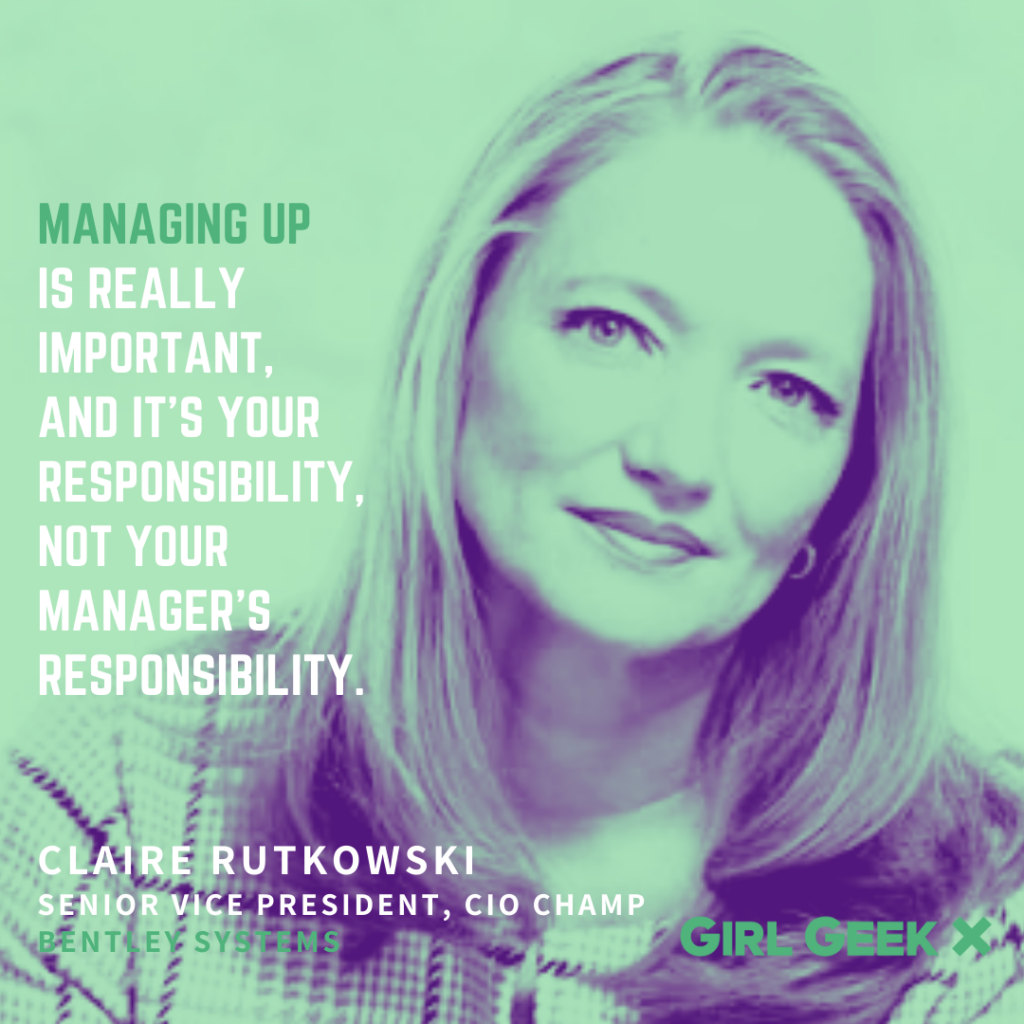
- Check out open jobs at our trusted partner companies.
- Watch all ELEVATE 2023 conference video replays!
- Does your company want to sponsor a Girl Geek Dinner? Talk to us!


